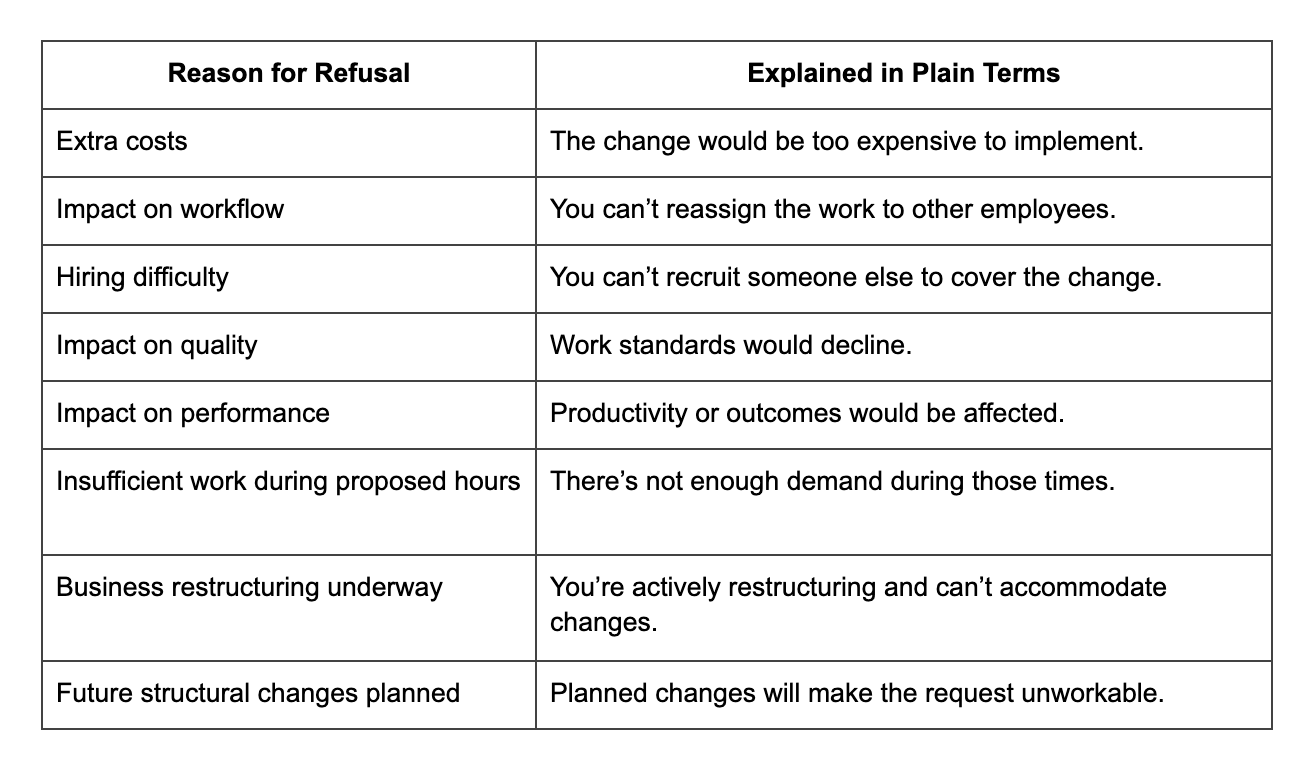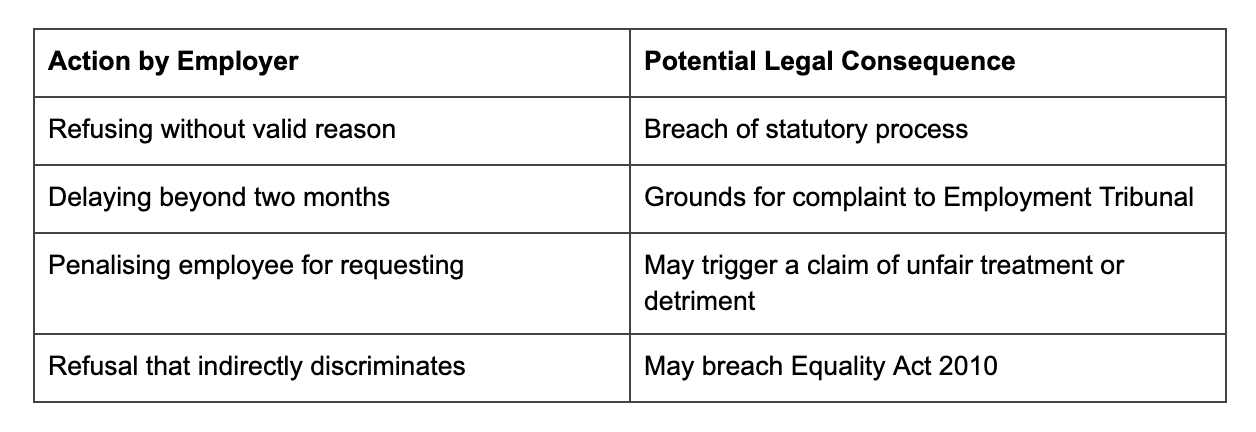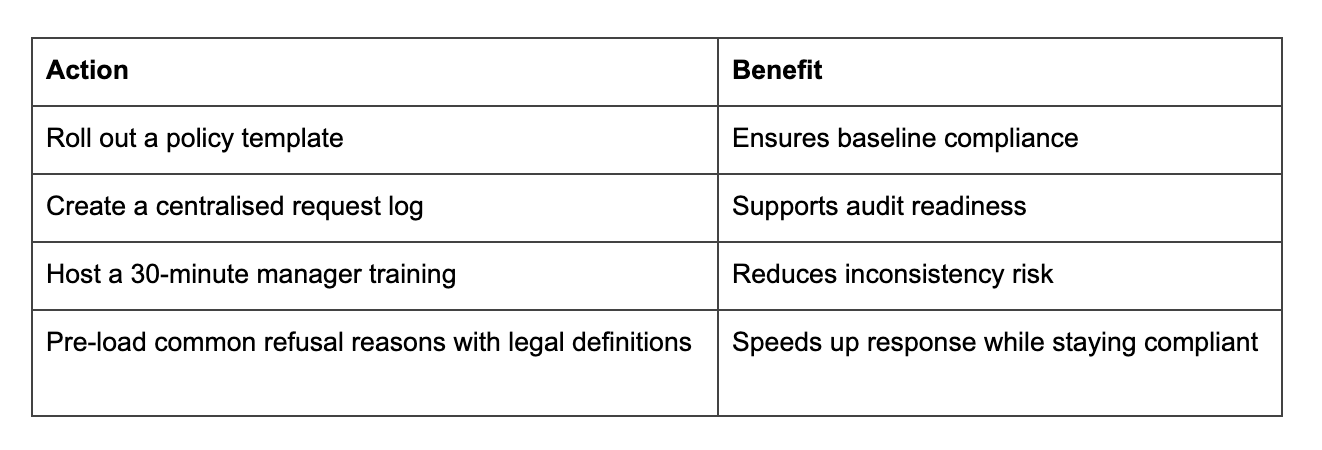Navigating UK Flexible Working Laws: Employer Obligations and Employee Rights
Flexible working isn’t just about working from home anymore. It’s a legal right with defined rules, timelines, and consequences for getting it wrong. In the UK, flexible working law now empowers employees to request alternative work arrangements, like remote setups, compressed hours, or staggered start times, from their very first day on the job.
With the Flexible Working (Amendment) Regulations 2023 coming into force in April 2024, the UK’s framework has shifted. Employers must now respond to requests within two months and demonstrate fair, evidence-based reasoning for any refusal. The stakes are high: mishandling a request can trigger discrimination claims, tribunal action, or reputational risk.
Whether you’re navigating this for the first time or updating your internal policy, this guide walks you through everything UK employers and employees need to know in 2025. We’ll break down the legal updates, explain your rights and duties in plain English, and provide tools to help you stay compliant, including case examples, templates, and red-flag scenarios.
By the end of this article, you’ll know how to handle flexible working requests confidently, and legally. Let’s demystify the law so you can lead with clarity, not guesswork.
What is Flexible Working in the UK?
Flexible working refers to any arrangement that alters the traditional 9-to-5, office-based model. In the UK, it’s now backed by law: as of April 2024, every employee has the legal right to request flexible working from day one of employment, a shift from the previous 26-week qualifying period.
There are two main types of requests:
- Statutory: A legal right. Employers must follow a set process and respond within two months.
- Non-statutory: Informal or policy-based, with no legal structure, but still worth handling carefully to avoid claims of unfair treatment.
Common Types of Flexible Working (UK)
- Remote work: Working fully from home or another location.
- Hybrid work: A blend of office and remote time.
- Part-time schedules: Fewer days or hours per week.
- Compressed hours: Same total hours in fewer days (e.g., four 10-hour days).
- Staggered start/end times: Shifting the workday earlier or later.
Flexible working applies across sectors, from finance to healthcare, legal to tech. While roles differ in how flexibly they can operate, all requests must be considered fairly and lawfully.
For a full breakdown of legal duties, timelines, and refusal grounds, visit my main Flexible Working Law Guide.
Who Can Request Flexible Working in 2025?
Here’s the big shift: you no longer have to wait six months to request flexible working in the UK. As of April 6, 2024, every employee has a legal right to make a flexible working request from day one of employment.
This is a major change from the previous rule, where employees needed to complete 26 weeks of continuous service before becoming eligible. The update reflects changing attitudes post-pandemic, recognizing that flexibility isn’t just a perk, it’s a legal expectation from the start.
Employers now have two months to consider and respond to each request under the new statutory rules. That includes providing a valid, evidence-based reason if they plan to refuse.
Here’s how the change looks at a glance:

So, whether you’re just starting a new job or managing new hires, the message is clear: flexibility starts on day one. And if you’re an employer, you’ll need a clear, documented process in place to handle these requests fairly and lawfully.
What Are Employers Legally Required to Do?
As of April 6, 2024, employers in the UK must follow a formal process when handling statutory flexible working requests. This is no longer optional. Failure to comply can expose the business to legal risk.
Legal Response Window

This consultation is not a formality. It must involve a meaningful conversation where alternatives are considered. A flat denial without discussion no longer meets legal standards.
8 Valid Grounds for Refusing a Flexible Working Request
UK legislation permits refusal only if one or more of the following statutory reasons applies:

Employers must provide a clear explanation linked to one of these reasons. Vague justifications or blanket policies are not legally valid.
What Your Process Must Include
- Acknowledgement of the request in writing
- A documented feasibility review
- A meaningful consultation, if refusal is likely
- A final written decision issued within 2 months
- Justification tied to one of the eight legal grounds
- Record-keeping for compliance and future audits
If your internal policy doesn't yet meet these requirements, it’s time to update it. See our Flexible Working Law Guide for step-by-step instructions, or contact us to audit your internal process.
What Rights Do Employees Have When Requesting?
Employees in the UK have a statutory right to request flexible working from the first day of employment. While there’s no automatic right to have the request granted, the law requires employers to handle each one fairly, consult meaningfully, and respond within two months.
Employees also have the right not to be treated unfairly for making a request. Any dismissal, demotion, or negative treatment linked to a flexible working request may amount to detriment, which is grounds for legal action.
If a Request is Mishandled
Unfair treatment or failure to follow the legal process can be challenged through:

Employment Tribunal: A Plain Summary
If an employer mishandles a request, the employee can escalate the issue to an Employment Tribunal. This is a legal forum that hears disputes related to workplace rights. In cases of flexible working, tribunals assess whether the employer:
- Followed the correct process
- Had a valid business reason for refusal
- Treated the employee fairly and lawfully
While many cases settle internally, tribunal risk increases where an employer appears dismissive, inconsistent or biased.
Best Practice Tips for Employers
With flexible working rights now embedded in UK employment law, employers must move beyond reactive case handling. A formal, well-documented approach reduces legal exposure and reinforces trust across the workforce.
Build a Legally Compliant Flexible Working Policy
Your flexible working policy must reflect the latest legal obligations, not just internal preferences. A compliant policy should:
- Clarify who is eligible and how to submit a request
- Set out a timeline for review and written response (e.g. within 2 months)
- Define roles (e.g. line manager, HR) in decision-making
- Outline an appeals mechanism
- Address data handling and documentation retention
Relying on outdated HR templates or informal handling increases your exposure to discrimination or tribunal claims.
Train Managers Across Departments
Consistency matters. A single unfairly handled request can lead to legal risk and internal distrust. Line managers should be trained to:
- Understand the legal process and timelines
- Avoid informal refusals
- Keep records of all requests, responses, and consultations
- Identify when refusal risks indirect discrimination
Legal handling isn't just a head office function. Apply the same standard across all teams and departments.
Quick Wins for HR Teams

A defensible process is no longer optional. With legal obligations now clearly defined, UK employers must act proactively. If your internal policy hasn’t been reviewed since the 2024 updates, now is the time to revisit it.
Sector-Specific Guidance
Not all roles can support the same level of flexibility, but the legal process for handling requests remains consistent across sectors. Employers must assess each case on its own merits, regardless of job type.
Office Roles
These typically lend themselves to hybrid or fully remote models. Many employers now define minimum in-office days (e.g. two or three per week) and standardise tools for collaboration. Consistency is key, unequal handling of similar roles can raise internal or legal issues.
Customer-Facing and On-Site Roles
Retail, healthcare, and manufacturing jobs often require physical presence. However, flexibility can still apply in other forms, such as staggered shifts, compressed hours, or part-time scheduling. The law still expects a genuine consultation, even if full remote work isn’t feasible.
Managing Hybrid Teams
Employers must set clear expectations for hybrid working arrangements, including:
- Minimum in-office days
- Agreed channels for daily communication
- Shared calendars and availability norms
- Regular check-ins to maintain team cohesion
The distinction between flexible vs. hybrid working matters. Hybrid working is a type of flexible working, but not the only one. In 2025, UK employers should be prepared to consider a range of models, as long as the business case allows it.
What’s Coming Next in UK Flexwork Law?
While the April 2024 legal updates were significant, UK flexible working policy remains in active development. Employers should expect further clarity and evolving expectations across 2025.
ACAS Code of Practice
The updated ACAS Code of Practice on handling flexible working requests now emphasises meaningful dialogue. Employers are expected to consult seriously, consider alternatives, and apply decisions fairly. While the code is not legally binding, tribunals will consider it when assessing disputes.
Ongoing Policy Trends
Several proposals remain under discussion, including:
- Wider adoption of the four-day week (with no loss of pay), particularly in the public sector
- Remote-first default contracts for eligible roles
- Right to disconnect legislation, mirroring developments in the EU
While none of these are yet law, they signal a shift. Flexibility is no longer framed as an exception, it’s becoming a core component of UK employment standards.
Employers should review internal practices regularly, stay updated via ACAS and GOV.UK, and prepare for more structured expectations around hybrid, remote, and alternative work models.
Staying Compliant with UK Flexible Working Law
Flexible working is now a legal right, not a perk, and that shift demands more from employers. With day-one eligibility, strict response timelines, and mandatory consultation, handling requests fairly and consistently isn’t optional. The law has changed. Your internal process needs to follow.
If you're unsure whether your policy holds up in 2025, I can help. I advise employers across sectors on how to meet legal standards, avoid tribunal risk, and implement flexible work practices that actually work. Get in touch for tailored support.

.jpg)

%20(1).jpg)
.jpg)






